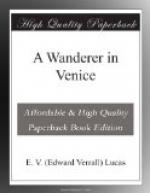Many persons stop at the Campo Santo, but there is not much profit in so doing unless one is a Blair or an Ashton. Its cypresses are more beautiful from the water than close at hand, and the Venetian tombstones dazzle. Moreover, there are no seats, and the custodian insists upon abstracting one’s walking-stick. I made fruitless efforts to be directed to the English section, where among many graves of our countrymen is that of the historical novelist, G.P.R. James.
[Illustration: THE RIO TORRESELLE AND BACK OF THE PALAZZO DARIO]
Murano is interesting in art as being the home of that early school of painting in which the Vivarini were the greatest names, which supplied altar-pieces for all the Venetian churches until the Bellini arrived from Padua with more acceptable methods. The invaders brought in an element of worldly splendour hitherto lacking. From the concentrated saintliness of the Vivarini to the sumptuous assurance of Titian is a far cry, yet how few the years that intervened! To-day there are no painters in Murano; nothing indeed but gardeners and glass-blowers, and the island is associated purely with the glass industry. Which is the most interesting furnace, I know not, for I have always fallen to the first of all, close to the landing stage, and spent there several amusing half-hours, albeit hotter than the innermost pit. Nothing ever changes there: one sees the same artificers and the same routine; the same flames rage; glass is the same mystery, beyond all conjuring, so ductile and malleable here, so brittle and rigid everywhere else. There you sit, or stand, some score of visitors, while the wizards round the furnace busily and incredibly convert molten blobs of anything (you would have said) but glass into delicate carafes and sparkling vases. Meanwhile the sweat streams from them in rivulets, a small Aquarius ever and anon fetches tumblers of water from a tap outside or glasses of red wine, and a soft voice at your ear, in whatever language you happen to be, supplies a commentary on the proceedings. Beware of listening to it with too much interest, for it is this voice which, when the glass-blowing flags, is proposing to sell you something. The “entrance” may be “free,” but the exit rarely is so.
Let me describe a particular feat. After a few minutes, in sauntered a little lean detached man with a pointed beard and a long cigar, who casually took from a workman in the foreground a hollow iron rod, at the end of which was a more than commonly large lump of the glowing mass. This he whirled a little, by a rotatory movement of the rod between the palms of his hands, and then again dipped it into the heart of the flames, fetching it out more fiery than ever and much augmented. This too he whirled, blowing down the pipe first (but without taking his cigar from his mouth) again and again, until the solid lump was a great glistening globe. The artist—for if ever there was an artist it is he—carried




